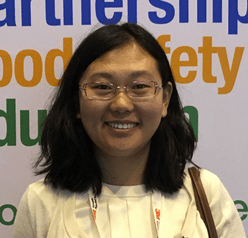Betty Yaohua Feng, is a Postdoctoral Researcher in the Department of Food Science and Technology at the University of California, Davis. She presented two sessions related to Positive Deviance at CFSEC2017.
Her research investigates the effectiveness of positive deviance interventions on changing consumers’ safe food handling attitudes and behaviors.
For those unfamiliar with the theory, Positive Deviance is based on the observation that, in every community, there are certain individuals whose uncommon practices (in this case- correct food safety behaviors) enable them to find better solutions to problems than their neighbors or colleagues, despite having access to the same resources.
The goals are to identifying best practices on how to reach these individuals and then to work with these “Positive Deviants” to promote food safety in a community or group.
Betty shares a story from her research:
a story from her research:
A few years ago, I piloted the Positive Deviance approach in classes with several different groups of people with diabetes. The classes covered the importance of food safety in diabetes. “Doreen,” one of the group members, was a 62-year-old woman with Type-2 Diabetes. She had never heard that having diabetes put you at higher risk for food borne illness. This was important news to her.
She attended all of the three group sessions offered. Doreen shared that before she came to the classes, she never realized that she should wash the apples she brought home from the supermarket before eating them. She was surprised to learn that. Doreen said, “They are so shiny and I only buy from big chains, so I assumed they were clean and ready to eat. I didn’t know they needed to be washed.”
Before and after the series, we gave food safety knowledge pre- and post- tests, and Doreen did very well with the post-test. Before the last session, she asked if I would like to go to her church and present food safety information to her friends and family and community members. This was very encouraging to me, as an educator. It is unlikely that before she attended the classes she would have invited a food safety expert to present information to her local congregation.
Doreen’s positive deviance was influencing her community!